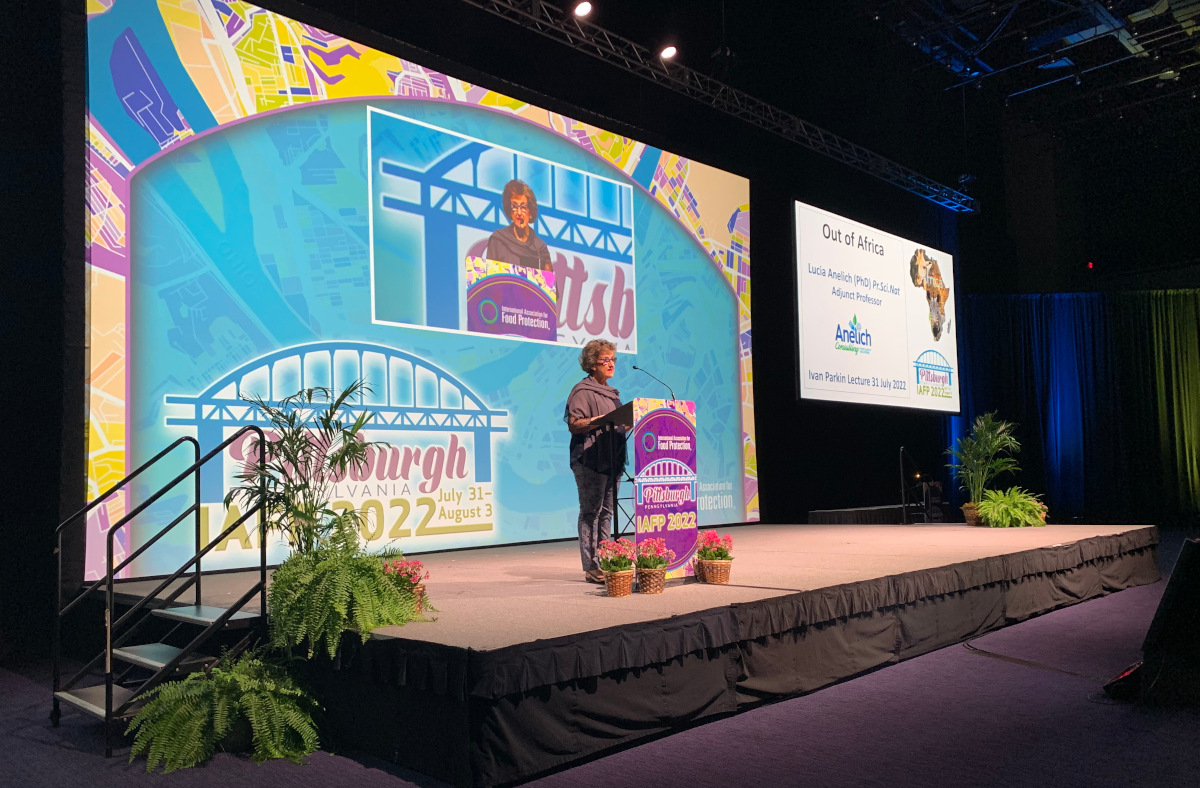
PITTSBURGH, PA — The opening session Sunday night of the annual meeting and conference of the International Association for Food Protection was one of good news.
Speaking to more than half of the 3,500 attendees, President Ruth Petran ticked off a number of accomplishments, none the least of which is the organizations rebound of its live event that is welcoming people from more than 47 countries to downtown Pittsburgh this week. As with the rest of the world large gatherings such as the IAFP annual event have been curtailed since 2020, but this year meetings, symposia, poster presentations and a trade show floor are all in full swing again.
Petran also cheered the organization for continuing to diversify in membership and programming. She also said one thing that keeps the IAFP organization pertinent is its ability to review itself, which it is doing on a continual basis.
Another high point this year is the fact that the organization’s publication the Journal for Food Protection is switching to open access status, making its information available to a vastly larger audience.
Also citing accomplishments and goals was Gary Acuff, head of the IAFP Foundation, which has raised $84,000 so far this year to further the association’s goals. Acuff noted that in 2005 the Foundation was able to give two scholarships, Since then the Foundation has given almost 250 scholarships, spending $100,000 now to help bring together the best and brightest in the food safety universe.
Acuff said the foundation members want to expand grants to include Europe, people with dependent care needs, professional development and international student exchanges. He challenged the group to meet $4 million for 40 years to mark the IAFP 40th anniversary in 2024.
Carrying on with the theme of accomplishments and future goals was Dr. Lucia Anelich, a food safety specialists and consultant from South Africa. Anelich delivered the prestigious Ivan Parkin Lecture. Prior to launching her consulting business in 2011, Anelich was with the Consumer Goods Council of South Africa where she established the country’s first food safety body for the food industry.
She spent 25 years at the Tshwane University of Technology in South Africa, later becoming the head of the Department of Biotechnology and Food Technology and associate professor, the first female head of such a department in South Africa.
In 2021 Anelich received the SAAFoST President’s Award as its first female recipient for her contributions toward advancing Food Safety Technology for the provision of safe and wholesome food.
Anelich opened her lecture by thanking IAFP for giving Africa a voice in the food safety arena. She then immediately challenged herself and others.
“It’s important to say what we need to say,” Anelich said.
And she didn’t hold her remarks to the topic of food — on the surface. She discussed animal conservation and told tragic stories of all kinds out of Africa. She described the conditions of street stalls selling dangerous foods and the luxuries of clean and shiny retail stores in other neighborhoods.
All of the stories had a common thread though — food. Poachers were often only doing what they thought they had to do to feed their families. The same with street vendors and operators of big grocery chains. The common thread is one of food insecurity. She said there are an estimated 828 million hungry people and many of them will eat unsafe food rather than go hungry for another day.
She said two basic needs in the food safety sector in Africa are the development of food safety standards and the harmonization of standards. She cited whole genome sequencing as an example of something that sounds great when making plans, but comes up short when you get to the reality of things. She has seen labs trying to do good work but hampered by expired growth compounds.
“We must deal with these basics before we can become fancy,”
she said.
(To sign up for a free subscription to Food Safety News,click here)
